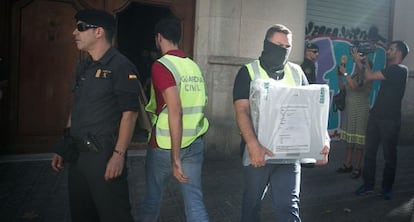Catalan premier says he is “big game target” in wake of arrests
Treasurer of Artur Mas’s CDC party arrested on Wednesday in ongoing graft probe Seven business figures also in investigation into alleged payment of illegal commissions

Ten people have been arrested today in a major raid against political corruption in Catalonia.
The Civil Guard launched the operation before 8am on Wednesday, and detained Andreu Viloca, the treasurer of Democratic Convergence of Catalonia (CDC), the party of acting premier Artur Mas.
One of the searches is taking place at CDC party headquarters in Barcelona
Seven business figures believed to have paid illegal commissions to CDC politicians in exchange for government contracts were also held. One of these individuals is Josep Antoni Rossell i Polo, head of Infraestructuras.cat, a Catalan government agency in charge of public works projects.
The arrests are part of an ongoing investigation into allegations of graft in a party that has ruled the region almost uninterruptedly for 37 years. Authorities are also investigating CDC foundations that are believed to have served for illegal party funding by attracting donations that were later funneled to CDC’s own coffers.
The court in El Vendrell that ordered this latest raid is the same one that in June sent the mayor of Torredembarra, Daniel Masagué, to prison after discovering that he had accepted €400,000 from Teyco, a construction company that carried out public works for the town.
Besides the arrests, police are also conducting searches at 20 sites, including private homes and the premises of businesses suspected of paying bribes to CDC officials. One of the searches is taking place at CDC headquarters in Barcelona.
Acting premier Artur Mas, who won the September parliamentary elections with the Junts pel Sí bloc – which includes his CDC party and the Catalan Republican Left (ERC) – has sought to portray the ongoing investigation as an attack against his independence bid for the region.
Speaking in the wake of Wednesday’s detentions, Mas criticized the actions of the public prosecutor and the Civil Guard. “Convergence and I are targets for big game hunters,” he said. “I have full confidence in the people who have been detained and who look after the party accounts,” he continued. “If anyone shows me that there is reason to doubt that confidence, I have always taken measures.”
But other Catalan parties – including CUP, a small leftist group which now holds the key to the regional government – have been highly critical of what they see as ongoing political corruption by a party that has been in power for decades.
English version by Susana Urra.
The “three-percent problem”
After months of analyzing seized documents, investigators have found that some of the commissions allegedly paid to CDC – normally through its CatDem foundation – coincide in time with the awarding of public contracts to donors. Although many of these fees represent around three percent of the value of the contract, some amounts are higher and some are lower.
Sources familiar with the investigation said that there was enough evidence to show that CDC has been securing illegal funds for years from businesspeople who in turn have benefited from contracts awarded by the regional government or by local councils ruled by CDC mayors.
It was the former Socialist premier of Catalonia, Pasqual Maragall, who first publicly accused CiU – the long-serving coalition of CDC and former partner Democratic Union of Catalonia – of "having a problem with three percent," a veiled reference to the bribes that CiU was allegedly accepting to award public works projects.
Tu suscripción se está usando en otro dispositivo
¿Quieres añadir otro usuario a tu suscripción?
Si continúas leyendo en este dispositivo, no se podrá leer en el otro.
FlechaTu suscripción se está usando en otro dispositivo y solo puedes acceder a EL PAÍS desde un dispositivo a la vez.
Si quieres compartir tu cuenta, cambia tu suscripción a la modalidad Premium, así podrás añadir otro usuario. Cada uno accederá con su propia cuenta de email, lo que os permitirá personalizar vuestra experiencia en EL PAÍS.
En el caso de no saber quién está usando tu cuenta, te recomendamos cambiar tu contraseña aquí.
Si decides continuar compartiendo tu cuenta, este mensaje se mostrará en tu dispositivo y en el de la otra persona que está usando tu cuenta de forma indefinida, afectando a tu experiencia de lectura. Puedes consultar aquí los términos y condiciones de la suscripción digital.








































